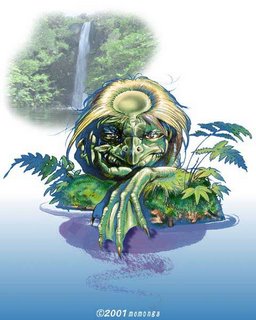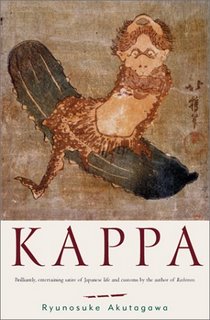Kappa in Pop Culture
 Nowadays, kappa are much less threatening and more... well, cute. There are toys, games, anime, and videos featuring the once-threatening creature. They appear in Shigeru Mizuki's long running comics, a film called "Kappa" produced my Bruce and Norman Yonemoto, and the very popular children's anime Pokémon. In the James Bond novelization "The Man with the Red Tatto" by Raymond Benson, an assassin is nicknamed "the Kappa" because of his short height. However, the media in which kappa are most prominent is video games. Mario's arch nemesis Koopa in Super Mario Bros. is basically a kappa, and there's even a place called Kappa Mountain in the game. A video gamed called "Kappa no Kaikata (How to Breed Kappa)" is the story of a boy who must raise kappa and teach them up to 30 manners for his grandparents while he stays at their place over the summer.
Nowadays, kappa are much less threatening and more... well, cute. There are toys, games, anime, and videos featuring the once-threatening creature. They appear in Shigeru Mizuki's long running comics, a film called "Kappa" produced my Bruce and Norman Yonemoto, and the very popular children's anime Pokémon. In the James Bond novelization "The Man with the Red Tatto" by Raymond Benson, an assassin is nicknamed "the Kappa" because of his short height. However, the media in which kappa are most prominent is video games. Mario's arch nemesis Koopa in Super Mario Bros. is basically a kappa, and there's even a place called Kappa Mountain in the game. A video gamed called "Kappa no Kaikata (How to Breed Kappa)" is the story of a boy who must raise kappa and teach them up to 30 manners for his grandparents while he stays at their place over the summer.Other sightings of kappa include but are not limited to:





